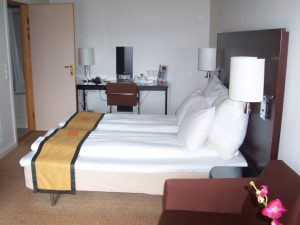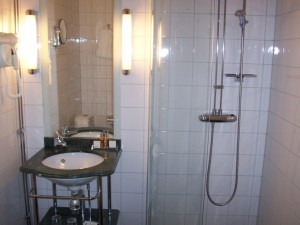Several years ago, early in my experience as an EF Study Abroad group leader, I had a mother and daughter join me on a trip through Italy and Greece. Our hotel in Rome was a bit outside the city in Civitavecchia, but the view was spectacular, overlooking the glistening Tyrrhenian Sea. Our travels that year took us from Rome to Florence, then down to Capri, Sorrento, and Pompeii, before we crossed into Greece where we visited ancient Delphi and Athens.
 I thought everything was going smoothly. The trip was winding down and the best was yet to come: a cruise around the Greek Islands. Therefore, when the mother announced that she and her daughter were leaving the trip and flying home before the cruise, I was stunned. She refused to give me any reasons, but later, others with whom she had confided in told me that she had been dissatisfied with the hotels where we had stayed.
I thought everything was going smoothly. The trip was winding down and the best was yet to come: a cruise around the Greek Islands. Therefore, when the mother announced that she and her daughter were leaving the trip and flying home before the cruise, I was stunned. She refused to give me any reasons, but later, others with whom she had confided in told me that she had been dissatisfied with the hotels where we had stayed.
Consequently, I created a short list called, “Don’t Know Much ‘bout European Hotels,” which I have sent to my trip participants every year. It’s designed to help set realistic expectations of what they will come across on our European adventures.
- European hotels are often somewhat smaller and less glamorous than U.S. hotels
- European hotels often have smaller lobbies than we’re used to
- European hotels are known for having smaller elevators, and occasionally we’ll have to put many bags in one elevator and send them all up together, while we walk up and take bags off the elevator as it arrives
- European hotels almost never have wash clothes
- European hotels occasionally do have hair dryers, but not always
- European hotels usually make wake-up calls without any problem, but occasionally those calls don’t get made. It’s best to have your own travel alarm
- European hotels often use large room keys that must be turned into the front desk when leaving the hotel
- European hotels occasionally use plastic swipe cards as room keys, and those cards may be necessary to activate lights and power in the room. Place card in slot on the wall near the door of the room to turn on lights in the room
- European hotels often charge to access phone cards, even prepaid phone cards, so check with the front desk before using phones in the room
- European hotels normally serve nice continental breakfasts of rolls or croissants and butter, occasionally yogurt and cereal, coffee, tea, and juice. Bon appétit!
In a way, I mourn the loss of the intimate, small European hotels that many of us remember from many years ago as more European hotels begin looking more and more American. I can recall one charming little place in Switzerland years ago where we heard the cowbells chime as the cows came to pasture right outside our windows. When one of our students plugged in her hairdryer, it blew the fuse for the entire floor and we were left in the dark! And before I even led my first CST program, I remember staying at a hotel in London that had visitors share a bathroom and pay extra for a bath!
I can recall one charming little place in Switzerland years ago where we heard the cowbells chime as the cows came to pasture right outside our windows. When one of our students plugged in her hairdryer, it blew the fuse for the entire floor and we were left in the dark! And before I even led my first CST program, I remember staying at a hotel in London that had visitors share a bathroom and pay extra for a bath!
Still, the important thing is for group leaders to set realistic expectations for the trip participants before they travel. If the hotels are more than they expect, all the better. Hopefully, most people will realize that the hotels are a part of the entire travel experience and not the whole of it.
Have you ever stayed in a European hotel? What did you think? Share a picture with us!
Find more “How To’s” and resources here.

